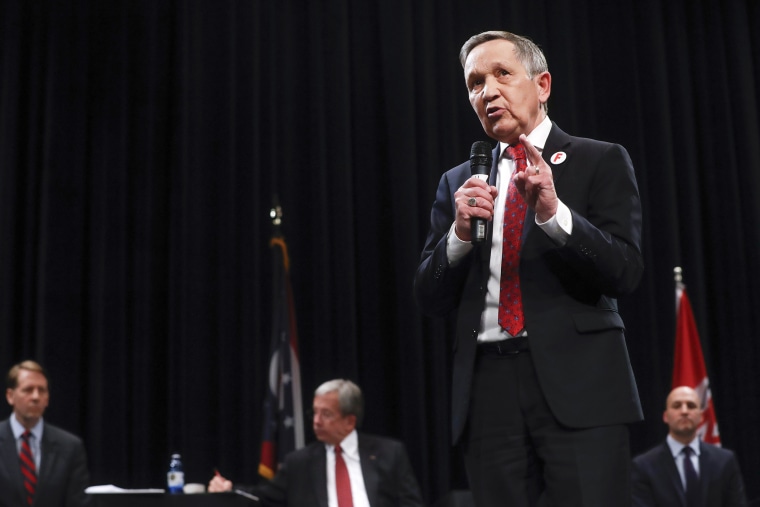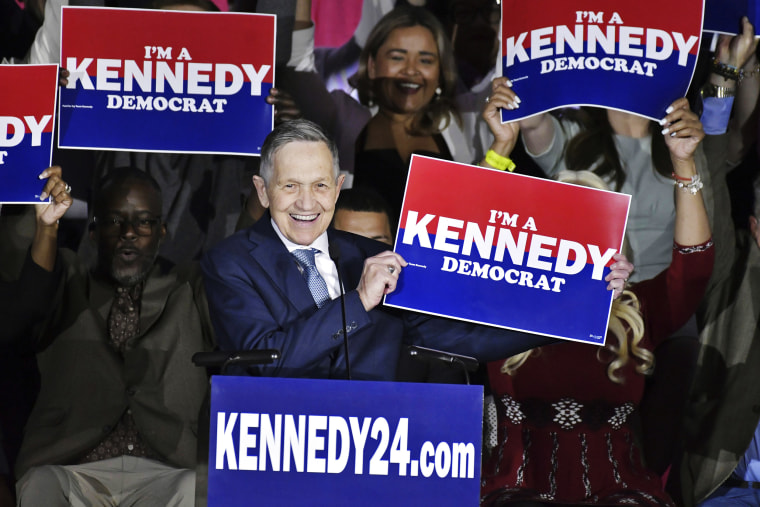Robert F. Kennedy Jr. has chosen former Rep. Dennis Kucinich to manage his 2024 presidential campaign, uniting the two famously idiosyncratic political figures in a long-shot attempt to defeat President Joe Biden in the Democratic primary campaign.
Kucinich, known for his own quixotic presidential campaigns, told NBC News he has been friendly with Kennedy for over 30 years, so joining his campaign “was an easy decision.”
“We’re looking at a campaign that could change America,” Kucinich said, calling Kennedy “everything the American people would want in a president and more.”
Kucinich's political career has faded in recent years, but during his 16 years representing Ohio in Congress and two presidential bids in 2004 and 2008, he developed a reputation as a firebrand anti-war progressive who was willing to take on his own party, at one cautioning fellow Democratic members of Congress that any president who launches a military attack without congressional approval could face impeachment after then-President Barack Obama launched airstrikes in Libya.

“Mr. Kennedy has an ability to reach out to the breadth of America that I don’t think anybody else can,” Kucinich said, arguing that the scion of America's most famous political family would be a stronger general election candidate than Biden if former President Donald Trump is the GOP nominee.
Kennedy has won praise from far-right figures, including an endorsement from conspiracy theorist Alex Jones, but Kucinich said that is merely evidence of his broad populist appeal, not of a darker strain of the candidate's support or collusion with conservatives trying to weaken Biden, as some Democrats have alleged.
“His very choice of me as his campaign manager should put any of those questions at ease,” Kucinich said.
Kucinich, 76, and Kennedy, 69, have similar worldviews, especially on foreign policy — both question U.S. support for Ukraine in its war against Russia and tend to view American hegemony as the root of many of the world’s ills.
The campaign’s strategy, fundraising expectations, staffing plans and office location are all still being determined, Kucinich said. Asked about party insiders who have said Kennedy will have a hard time recruiting experienced staffers to work on his campaign, Kucinich replied, "Tell those Democratic operatives to give me a call."
Kucinich bristled when he was asked about Kennedy’s activism against vaccination mandates, asking why it was relevant, echoing Kennedy’s position that he is not anti-vaccine and suggesting the issue will not be a central part of the campaign.
"He’s been an environmental attorney for 40 years, and he raised questions about the safety of some [vaccines]. He's not anti-vaccine," Kucinich said.
Kucinich was elected mayor of Cleveland in 1977 at age 31, earning him the nickname “Boy Mayor.” He presided over one of the most tumultuous times in the city’s history. Cleveland went into default under his watch after he refused to sell the city-owned electric company. He barely survived a recall campaign and was defeated in his 1979 re-election bid.
He worked his way back up from the bottom, winning a City Council seat in the 1980s and then moving on to the state Legislature before he secured a congressional seat. Meanwhile, his decision to hold on to the electric company aged well, drawing praise from those who came to recognize it as a city asset. But his political instincts began to yield diminished returns later in his career.
Aside from his long-shot White House bids, Kucinich lost his House seat after another Democratic fixture, Rep. Marcy Kaptur, clobbered him in a 2012 primary after redistricting. After that defeat, Kucinich started courting conservative media and others on the political right, landing a stint as a Fox News commentator. He also raised eyebrows when he praised Trump’s inaugural address in 2017.
Kucinich’s later comeback attempts proved futile. He lost a Democratic primary for Ohio governor in 2018. And a full-circle bid to return as Cleveland’s mayor fell short in 2021 when he failed to advance from a nonpartisan primary.
Headlines from that race included his initial refusal to disclose whether he had been vaccinated against Covid. He later released a letter from his doctor that cited a “chronic health condition” that “requires prudent consideration of any potential therapeutic intervention” and did not list a vaccination among a course of precautions he was taking to prevent catching the coronavirus.


